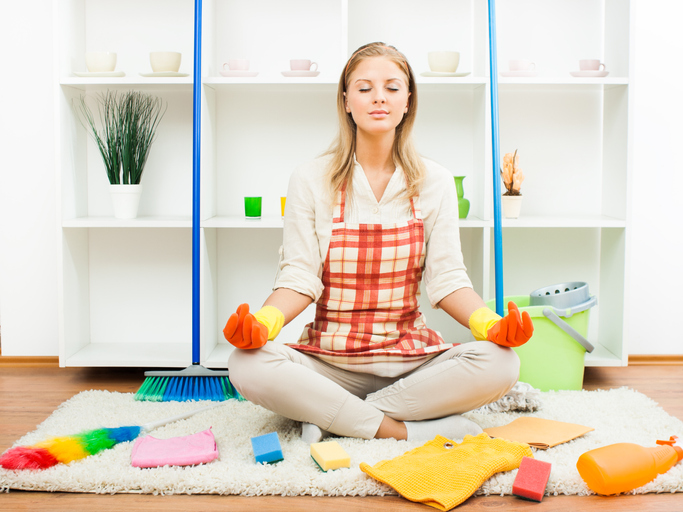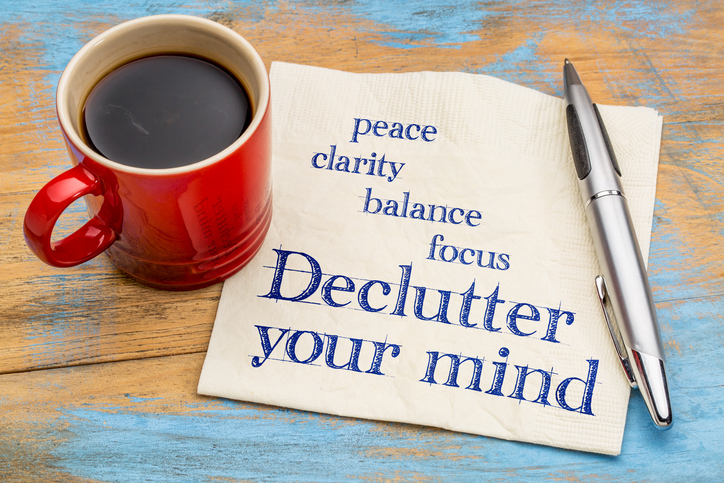Did you know that physical clutter can cause mental clutter? That’s right – a messy space leads to a messy mind.
Which is why if you want to improve your focus, you’re going to want to check out our decluttering tips to get your house in order.
Clutter bombards you with excessive stimuli, which forces the brain to work overtime to process it all. In addition, physical clutter signals the brain that there’s always something that needs to be done, which can be mentally exhausting.
Neuroscientists at Princeton University found that people’s task performance went down in disorganized environments because clutter has a negative impact on your ability to focus.
Yet many of us have a hard time letting go of all the “stuff” that is taking over our space.
Why does clutter happen? And what are some steps you can take to control it?
Get ready to lighten your load, physically and mentally, as we share decluttering tips to help you tackle the clutter that’s dragging you down.
How Clutter Happens
There can be lots of reasons why you hang onto things. Maybe an item has sentimental value, or you think you might need it later down the road, or it was too expensive to let go.
Whatever the reason this stuff came into your possession – the hard truth is, you probably made a mistake buying it in the first place, and it literally hurts your brain to accept that.
What are we talking about? Researchers at Yale have discovered that the two parts of your brain associated with pain actually light up when you’re thinking about getting rid of an item you’ve become attached to.
This is the same part of your brain that lights up when you hit your thumb with a hammer, or step on a piece of glass.
“Your brain views losing a possession you value the same way it views something that causes you physical pain. The more attached you are, the more it hurts to let it go.”
To make matters worse, researchers have also discovered that merely touching an item can cause you to become more emotionally attached to it.
That’s why stores always try to get you to touch the merchandise. Because once you have physical contact with it, they know you’ll value and want it more.
It’s easy to see why letting go of objects can can be so hard. But it’s also easy to see how having a cluttered home or workspace creates distracting noise that keeps you from performing your best.
How can we take control of the stuff that is taking over our lives?
Check out these decluttering tips and see if setting some of your possessions free doesn’t help free your mind in the process.

Decluttering Tips
1. Apply Constraints
One of our favorite decluttering tips is to create a system to help control your consumption in the first place.
For example, set limits for how may books you have on your shelf, or how many pans in your kitchen, etc.
Then practice a “one-out, one-in” inventory system where every time you buy a new book or pan, an old one needs to be donated or thrown away.
RELATED: Great Organizing Tips To Declutter Your Life!
2. Small Storage Spaces
Cut back on your storage space and notice the impact it has on your consumption.
For example, do you rent a storage locker or room? Empty it out and cancel the rental agreement. If something won’t fit in your home, don’t buy it.
Use a small carryon bag when you travel, so you don’t pack anything you don’t need.
Get rid of large storage tubs in your garage so you can’t fill them with stuff anymore.
Make less room so you’ll buy less things.
3. Try The Oprah Closet Hanger Trick
She may not have come up with the original idea, but Oprah Winfrey made it famous.
To figure out which items of clothing are just taking up space, hang all your clothes with the hangers in the reverse direction. After you wear something, place it back in the closet with the hanger turned right-way round.
After six months you’ll know exactly which clothes are being used, and what you can donate or discard.
4. Clean Your Desktop Daily
If you work on a computer, having a bunch of files scattered on your desktop every morning when you log in can give you an anxious, stressed out feeling.
At the end of each day, make it a habit to move files off your desktop and into the appropriate folders.
This way you start each day with a clean slate and an unstressed mind.
5. Donate One A Day
Walk through your house and find one item every day you want to donate and place it in a box.
At the end of the month, drop the box off at your local charity feeling lighter.
This works with kids that have way too many toys too!
They can learn about giving to others, and declutter their rooms at the same time.
6. Pick Just One Spot
Sometimes decluttering your entire house can seem overwhelming.
Instead, try picking just one spot (like your desk, or the coat closet) and focus your efforts there.
You’ll feel like you accomplished something, without completely stressing yourself out.
The following day, pick another spot. Before you know it, the entire house will be organized!
RELATED: Simple Organization Ideas For A Healthier, Happier You
7. The Four-Box Method
These decluttering tips are for when you’re ready to tackle a bigger organization project, like your closet, bathroom, or garage.
Get four big boxes and label them: “TRASH”, “DONATE”, “RELOCATE”, or “KEEP”.
Each item in the area needs to go in one of the boxes.
Once everything is in a box, you can organize the “keepers” back into the less cluttered space.
Move the “relocate” items somewhere else, and get rid of the donate and trash boxes.
No matter how you choose to tackle the clutter, once you reduce the amount of stuff in your life, you’ll find yourself feeling more creative and productive.
Getting rid of background noise frees up space in our brains to focus on the things that matter most to us.
So take a deep breath, and start letting go. There’s a world of freedom hiding underneath all that clutter, you’ve just gotta find it.
SHARE these decluttering tips on Facebook and Pinterest by clicking the buttons below.












